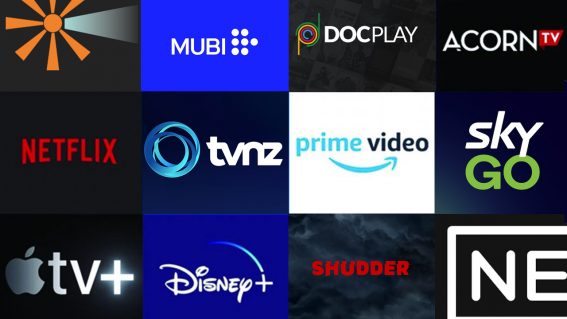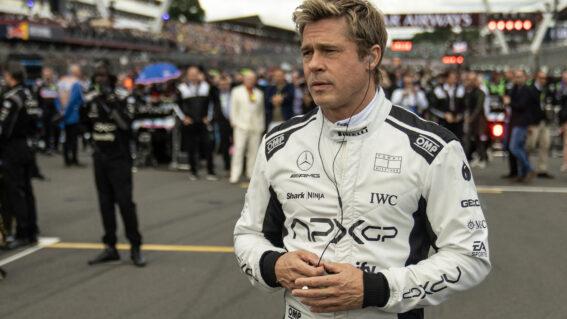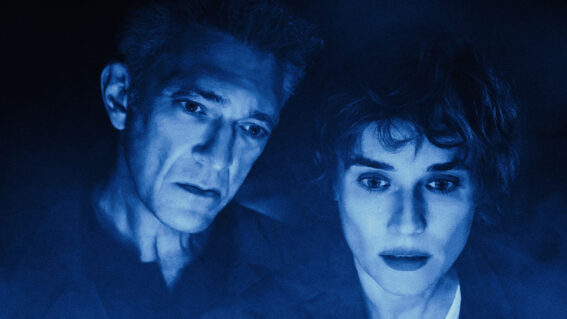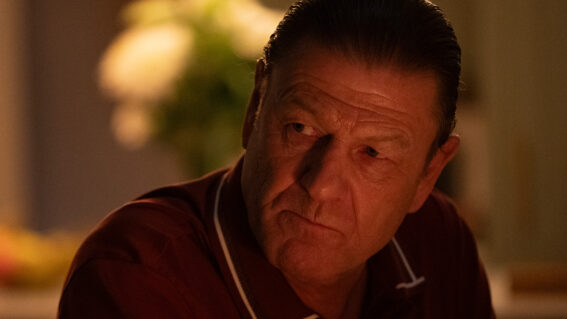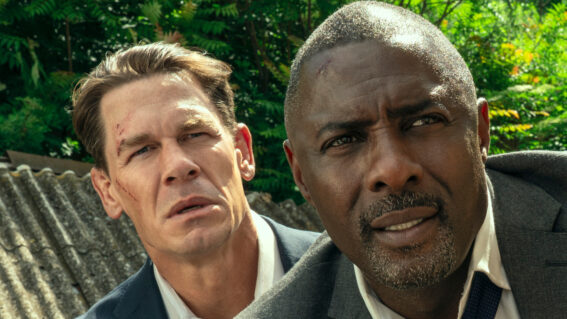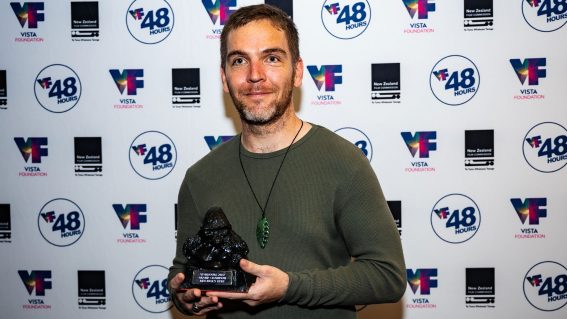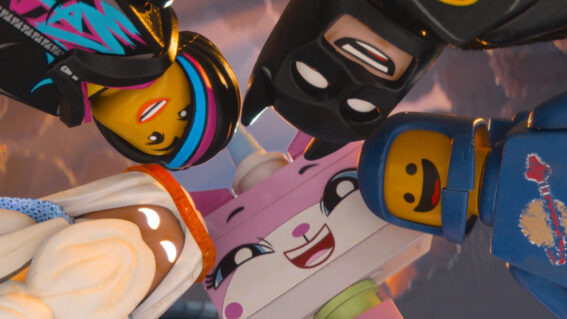Oscar Kightley tells us about his excellent doco on music phenomenon Dawn Raid
Oscar Kightley chats to Flicks about his doco on a South Auckland music phenomenon.
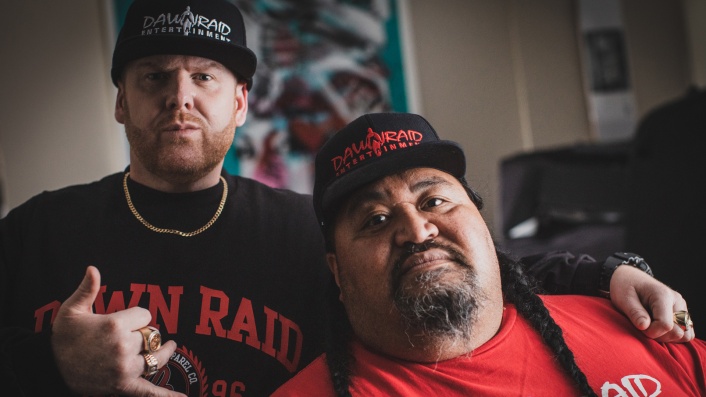
Oscar Kightley joined us for a chat about Dawn Raid, his excellent new doco telling the story of the iconic South Auckland record label.
In the early 2000s a musical phenomenon exploded out of South Auckland. A record label (and business conglomerate) formed by two young men who met in a business class at Manukau Polytechnic, Dawn Raid Entertainment went from selling t-shirts to introducing audiences to the likes of Deceptikonz, Adeaze, and Aaradhna. Dawn Raid took Savage to the world—and then it all came crashing down.
See also:
* All movies now playing
* These were the 20 best movies of 2020
Dawn Raid founders Andy Murnane and Tanielu Leaosavai’i (better known as Brotha D) tell their story in Dawn Raid, a doco that captures the rise of something really special at a time when no one thought it was possible. Director Oscar Kightley chatted to Steve Newall about his film, playing in cinemas now.
FLICKS: At your recent Q&A screenings you’ve come out to talk with audiences who’ve just spent an hour and a half sitting in the culture that they love.
OSCAR KIGHTLEY: You don’t realize just how neat that is. The thing I love about performing in the theater is that the audience is right there and they’re reacting with you in real-time, and you don’t get that with films. If you get to go and see an audience as soon as they’ve seen something and you’re there with the two stars of the film and you see that reaction live, it’s quite special.
Something that hasn’t happened in my experience of live theater – a ripple hasn’t gone around the theater because the Boost Mobile Hook Up ad has played, like happened here.
Yeah, there’s a lot of weird moments like that throughout the film. When I’ve seen the film all the way through with an audience, I’m watching and listening to the audience more than what’s happening on the screen. It’s always interesting what different things hit.
The archival stuff in the film is great. It must be lucky for you as a filmmaker to have lots of news stories to discover and also Dawn Raid filming stuff for themselves. I guess part of being a hip hop label was running around with a video camera.
That was always part of Andy’s hustle, you know, they weren’t just thinking T-shirts, barbershops, nightclubs, record label. They were thinking of making a film one day that would document their journey. And so when we came to see the archive, it was amazing. It was an absolute gift that for so many years, Andy had a camera. And I even remember back at the time, he always had a bloody Handycam in his hand and was always shooting and, you know, used to say this will be for Southside Story One.
Now, they didn’t produce this film, and they had no creative control over it—this was a GFC Films production—but man, because I hate reenactments in docos, it was amazing to have that. And also, as you say, there was so much archive at TVNZ, Tagata Pasifika, TV3, that marked different parts of their journey, their beginning, their rise… and also their controversies.
You’d be kind of hard-pressed to find people with the same charisma as Andy and Danny, they had something about them from day one. The way that you present their interviews – eyes locked with the audience, telling their story – you get something out of them that we haven’t seen before. They’re both very accomplished on camera, but it seems to have a different tone here. Were you setting out to break the mold of their familiar personas?
It wasn’t about breaking any mold, I just love that technique. I worked on this documentary on the All Blacks for Amazon Prime in 2017, and I was introduced to this device that you attach to the camera and then you do an interview and they’re not looking down the barrel of the camera. They’re looking at you. What they see is you, so they’re talking to you.
I didn’t expect them to be as incredible and compelling stories as they were, even though I always knew they were very charismatic and great storytellers. So what you’re seeing is them looking at and talking to me. And I think maybe because I’ve known them for so long, they were a bit more relaxed and a bit more open.
I was just a fan like everyone else, and I didn’t know the ins and outs. Being their mate kind of added to the responsibility, because they trusted me a lot. I’m not sure they would have agreed if it was someone else. I was asking questions I would never ask my friends, you know. It was tough at times, but it was also like filling in the gaps behind the bits I knew, behind the headlines, behind the parties, behind the news items on TV.
It helps to have the amazing editing job that Tim Woodhouse did, and all the pictures that our research team found in archives that kind of coloured it in so that it wasn’t someone talking to you for too long, you know, to a point where you needed to look away or feel uncomfortable.
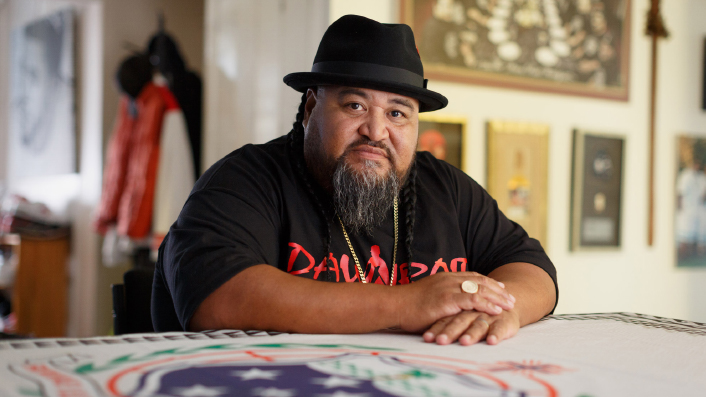
The downfall of Dawn Raid features in the film. I’m guessing it was probably one of the more complex areas to convey, compared to some of the more triumphant moments.
Yeah, it was always going to be part of the story, you know, it was never intended to be a puff piece, where we omitted some of the less cool things that happened. It was always going to be tricky how we would treat that. And also, just as a friend to even ask them about it was difficult and for them as a mate to answer the question. I’m probably asking them stuff that no one had asked them before—stuff that maybe they only would ever discuss with their close family. And even it would always be a guarded moment, but, you know, we wanted the audience to see exactly how these guys feel about everything that happened.
It’s a crazy story because it’s a classic showbiz, almost smoke and mirrors, rise to success. The quality of the artists is obviously there. But, man, the hustle was something else.
You know, if you were to write this as a narrative for a film, you might start with a street leader, and their unlikely friendship with a redhead Irish kid from the neighborhood. But maybe people wouldn’t believe it. You know, people might go “That wouldn’t happen. Oh, what an unlikely character. As if, that doesn’t feel authentic”. But that was the amazing thing, you know, this really happened, this was a true story, and these are the people telling you. You could write it, but people would think it was a cliché—but it was real.
Do you think it’s easy for music fans in New Zealand today, who are used to seeing the recent years of success at home and internationally, to take a lot of Dawn Raid’s achievements for granted?
I mean, the landscape’s changed so much now, but I think that’s what makes this interesting. It’s almost like they got their record company at the last stage where you could have one. When that model still worked.
It was also interesting to me to trace that development, because all those changes in the music world were happening, and I think you see that in the film in terms of presenting the context of what was going on in the industry. I mean, nowadays, Jawsh685, the kid from Manurewa, would make a beat in his bedroom and then it’s picked up by an artist and it conquers the world—a very different path to what the Dawn Raid boys went through. But then again, you know, being discovered in your bedroom, isn’t that compelling a story for 90 minutes, you know?
I think that’s what makes this story interesting, is that it happened when it did. And the way it did. I think I can only think of Flying Nun as another label that was so attached to a place, like Kirk Harding says in the film. And because of the place that they were attached to, that brought all those other factors in—the community aspirations, the expectations, the traditional stereotypes about certain communities. The place they were from was such a huge part of why they did what they did and I think that makes the story bigger.
I can remember being a kid and listening to Motown and just loving the music and obviously had never been to Detroit, but just the way that music reflected the era and the place, you know… I think that’s a cool thing when you can match music to a place. And then that place fills in all the things that speak to you about that music.
When it came to Dawn Raid artists and the criticisms that eventuate later in the film, was it hard to get Aaradhna and Adeaze onboard, given that they had some difficulties to share?
Yeah, it was challenging, it wasn’t always easy – it was hard to get Brotha D and Andy in the film, before we even got to the artists. It definitely wasn’t always an easy dance. And, you know, a lot of credit has to go to producer Leela Menon and the way she dealt with the people. We just had to be really consistent in that we wanted to tell a truthful story. We wanted it to be fair, and we didn’t want it to be a puff piece that kind of glossed over stuff.
I knew that it would be a record that’s going to be there forever and that people change the way they think about things as time goes. And I just wanted this particular record to ultimately be something that honoured everybody involved and why they did it. I remember seeing a doco once on UB40, one of my favourite bands, and it was kind of terrible because it was them badmouthing each other and why they split up and why the two brothers are in different bands and, you know, accusations and stuff. And I know that was true to them and that was important to them, obviously. But as a fan I kind of wish I hadn’t seen it. Now when I listen to UB40, I have to look past the fact that they hate each other now.
We don’t make many feature docos in New Zealand. And also, in particular, we don’t make many feature docos on brown artists, so as a brown creative, I did feel a bigger responsibility. To not make it stink, or dark. I feel like we achieved the balance that people got to see that there was trouble. There was pain. And it wasn’t all roses and light. I didn’t want to make a 60 Minutes investigative item, you know what I mean? Because who wants to see that? That’s what you’re supposed to watch on Sunday night, you know, dramatic close-up shots of people not liking each other.
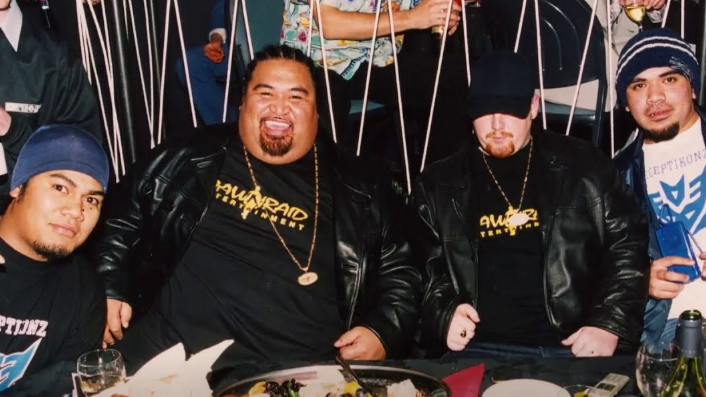
It feels like the right amount of time’s passed with Dawn Raid. You don’t need to explain what New Zealand was like 15 years ago, but we’ve also had enough time to develop a sense of nostalgia for some of that stuff.
I really do think, Steve, that it was a golden period for not just hip hop, but also all New Zealand music. There’d been that cry during the 90s of a need for a compulsory music quota on radio. By that time, it didn’t need to be compulsory because that’s what the people wanted and that’s what radio stations realised they had to play because there was such a following. And also in movies and television, too. I remember because I was coming up as a playwright, I was kind of making the move from stage to screen, and there was a whole lot happening in New Zealand.
The story’s obviously centred in South Auckland, and it’s a bit of a trope when you’re doing publicity to say “oh, it’s a story for everyone,” but I really think it’s a wider New Zealand story. We have a tradition in this country of the little battler and coming from the backblocks to climb the world stage. One of the things about the film for me is it speaks to that. It’s not just about these two gifted hustlers from the southside of Auckland that had a dream and then made it. They were part of the New Zealand landscape where this happened a lot.
I think it’s a real thing for Kiwis to leave your hood—we’re always proud of those of us that make it to the world stage, whatever that is, whether it’s fashion, business, or anything. And so I hope this finds an audience beyond people who just love hip hop or remember those guys, or who were fans of those groups. It’s the story of a hip-hop label, but it’s about other stuff. I’ll leave that to the audience and I’m sure you as one of our very experienced film connoisseurs saw that, I hope.






